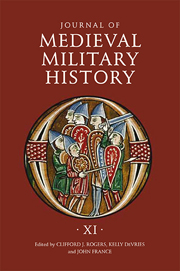Book contents
- Frontmatter
- Contents
- List of Illustrations and Tables
- 1 Military Games and the Training of the Infantry
- 2 The Battle of Civitate: A Plausible Account
- 3 The Square “Fighting March” of the Crusaders at the battle of Ascalon (1099)
- 4 How the Crusades Could Have Been Won: King Baldwin II of Jerusalem's Campaigns against Aleppo (1124–5) and Damascus (1129)
- 5 Saint Catherine's Day Miracle – the Battle of Montgisard
- 6 The Military Effectiveness of Alan Mercenaries in Byzantium, 1301–1306
- 7 Winning and Recalling Honor in Spain: Pro-English Poetry in Celebration of the Battle of Nájera (1367)
- 8 The Wars and the Army of the Duke of Cephalonia Carlo I Tocco (c. 1375–1429)
- 9 Sir John Radcliffe, K.G. (d. 1441): Miles Famossissimus
- 10 Defense Schemes of Southampton in the Late Medieval Period, 1300–1500
- 11 French and English Acceptance of Medieval Gunpowder Weaponry
- Journal of Medieval Military History 1477–545X
2 - The Battle of Civitate: A Plausible Account
Published online by Cambridge University Press: 05 October 2013
- Frontmatter
- Contents
- List of Illustrations and Tables
- 1 Military Games and the Training of the Infantry
- 2 The Battle of Civitate: A Plausible Account
- 3 The Square “Fighting March” of the Crusaders at the battle of Ascalon (1099)
- 4 How the Crusades Could Have Been Won: King Baldwin II of Jerusalem's Campaigns against Aleppo (1124–5) and Damascus (1129)
- 5 Saint Catherine's Day Miracle – the Battle of Montgisard
- 6 The Military Effectiveness of Alan Mercenaries in Byzantium, 1301–1306
- 7 Winning and Recalling Honor in Spain: Pro-English Poetry in Celebration of the Battle of Nájera (1367)
- 8 The Wars and the Army of the Duke of Cephalonia Carlo I Tocco (c. 1375–1429)
- 9 Sir John Radcliffe, K.G. (d. 1441): Miles Famossissimus
- 10 Defense Schemes of Southampton in the Late Medieval Period, 1300–1500
- 11 French and English Acceptance of Medieval Gunpowder Weaponry
- Journal of Medieval Military History 1477–545X
Summary
On 18 June 1053 in the undulating open country of the Capitanata of northern Apulia, near an ancient Roman city which no longer exists, one of the most crucial battles of the Middle Ages was fought. At Civitate, a modest force of Norman adventurers faced a papal army of Germans, Italians and Lombards, perhaps twice its size. The outcome of that clash in what is today a sparsely populated region would profoundly influence the course of Mediterranean history for centuries to come. It is recorded in more than a score of contemporary sources. The most comprehensive accounts are provided by the three primary chroniclers of the Normans in the South: Amatus of Montecassino, Geoffrey Malaterra and, especially, William of Apulia. Their narratives are largely corroborated by the Swabian historian Herman of Reichenau, and the various biographers of Pope Leo IX. Yet the details of the event remain mired in myth.
Although much has been written about the engagement, what actually happened has been obfuscated by legend, poetic license and outright partisan myth-making. Even Dante Alighieri reserved a few effusive lines of verse in his renowned La divina commedia to extol the exploits of one the battle's epic heroes: “With those who felt the agony of blows by making counterstand to Robert Guiscard.” In the modern era, Sir Edward Gibbon's account of the encounter in The Decline and Fall of the Roman Empire is rather short and somewhat impaired by the pretentious prose of the era.
- Type
- Chapter
- Information
- Journal of Medieval Military HistoryVolume XI, pp. 25 - 56Publisher: Boydell & BrewerPrint publication year: 2013



